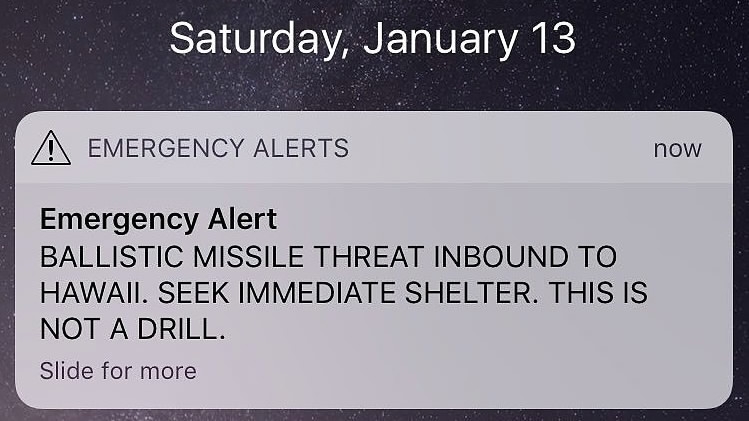
World
12:14, 31-Jan-2018
Top officials resign over Hawaii false missile alert
CGTN

Top officials have resigned and an employee at the Hawaii Emergency Management Agency (HEMA) who triggered a false missile alert earlier this month has been fired, investigators said Tuesday, highlighting a series of errors that led to Hawaii residents scrambling to seek shelter and reach loved ones.
On January 13, mobile phones across the Pacific islands received an emergency alert around 8:07 a.m. that was also transmitted by television and radio stations.
"EMERGENCY ALERT BALLISTIC MISSILE THREAT INBOUND TO HAWAII. SEEK IMMEDIATE SHELTER. THIS IS NOT A DRILL," the message, issued amid heightened tension over the DPRK's nuclear weapons program, stated.
It went uncorrected for 38 minutes and triggered hysteria and confusion across the Pacific island state.
The top two civilian officials at HEMA, administrator Vern Miyagi and executive officer Toby Clairmont, had resigned, it was announced at a news conference in Honolulu on Tuesday.

A morning view of the city of Honolulu, Hawaii is seen on January 13. /VCG photo
A morning view of the city of Honolulu, Hawaii is seen on January 13. /VCG photo
The employee who activated the false alarm – a 10-year veteran of HEMA with a history of job performance issues, including twice confusing drills with real emergencies – was sacked.
A mid-level agency manager who played a major role in devising the procedures and checklists for HEMA's missile alerts and drills was also due to be suspended.
The investigation into the incident found the system for activating a missile alert and conducting emergency drills was deeply flawed, lacking sufficient clarity, fail-safe controls or even a pre-programmed way of issuing a false alarm notice to the public.
On January 13, a supervisor decided to initiate a drill during a weekend shift change. A recorded message was then played over the phone which began and ended with the words "exercise, exercise, exercise."
The message, however, also included the phrase "This is not a drill" used for an actual live ballistic missile alert.
Five others in the center said they heard the "exercise" phrase but the system officer who eventually issued the alert said he only heard "This is not a drill."
The Federal Communications Commission (FCC) said in a separate report that the false alarm stemmed from human errors, confused wording in the drill, lack of adequate supervision and poor computer software.
For instance, the state's missile launch alert was activated from a "drop-down" computer menu. The HEMA officer then clicked "yes" when a system software prompt asked, "Are you sure that you want to send this Alert?"
The FCC was also critical of HEMA's failure to develop "standard procedures" to cancel a false alert.
In the future, the FCC said, supervisors will receive advance notice of all drills and two warning officers will validate alerts instead of one.
8163km
Source(s): AFP
,Reuters

SITEMAP
Copyright © 2018 CGTN. Beijing ICP prepared NO.16065310-3
Copyright © 2018 CGTN. Beijing ICP prepared NO.16065310-3